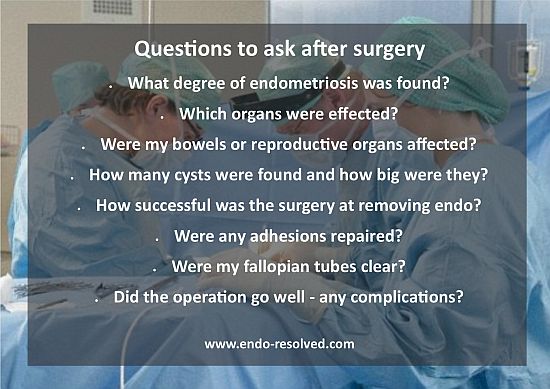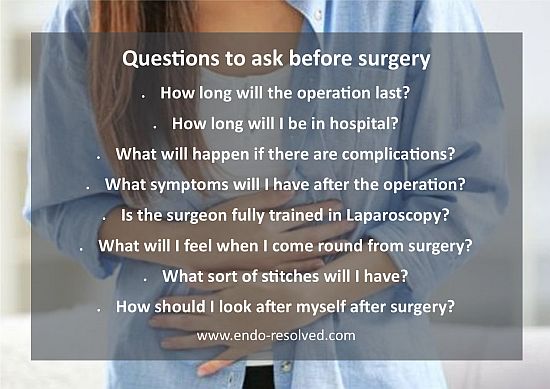Endometriosis treatment questions
What to Ask Before any Surgical Treatment
It is important to ask your consultant or doctor exactly what type of surgery you are undergoing for your treatment, and to have everything explained that you do not understand or are unclear about.
Your treatment questions need to include:
- How long will the operation last?
- How long will you be staying in hospital, and how long does it take to recover?
- What action will be taken if complications occur i.e. if a laparoscopy cannot help will a Laparotomy be performed?
- What symptoms can you expect after the operation?
- Is the surgeon fully trained in laparoscopic techniques?
- What type of surgical equipment/lasers do they have to be able to back up their surgical needs?
- What will you feel as soon as your come round from the operation - getting an answer to this one really helps alleviate the fear and anxiety many people suffer when they wake from surgery
- What sort of stitches will you have - will they be dissolvable or have to be removed later
- How should you look after yourself when you go home i.e. how to move the body, any gentle exercise to aid recovery
What to Ask after your Surgery
When you have recovered from your operation, it is important to ask the surgeon exactly what has been done. This is often done at a follow-up appointment, if not done at the time of the procedure. Women are often given insufficient information about their problem.
You should consider asking the following questions:
- What degree of endometriosis was found?
- How extensive was it?
- Which organs were affected?
- Were there any adhesion's?
- Were your bowel or reproductive organs affected in any way?
- How many cysts were found and how large were they?
- How successful was the treatment at removing the endometriosis?
- Were any adhesion's repaired?
- Are your fallopian tubes clear?
- Did the operation go well? i.e. were there any minor complications?
- What are your future prospects for conception and having children?

You will no doubt have other questions of your own, so write down a list to take to the hospital with you. Make sure the list is kept safe while you have your operation. It may be no good returning to your surgeon a few weeks or months after the operation to get advice as he or she may not remember your case so well.
Issues to consider regarding your treatment
- All surgical procedures carry the element of risk
- All drug therapy is going to have side-effects
- It is not known how long lasting the side-effects from drugs can be
- Having an anaesthetic can stay in your system for months
- Find out all you can about each treatment being offered, so you can be prepared, for example, you can prepare your body for an operation by good nutrition
- If you intend to start, or maintain your treatment using modern drug and chemical therapy, then do as much as you can to look after your body, to give it support.
- Get as much help as you can from friends and family. If they do not understand this disease then lend them a book or some leaflets, a magazine article, anything - so they understand.
- You will need lots of help and support especially after an operation, or if you are trying to adjust to new drug treatment.
- Be kind to yourself, do not push yourself too hard
Reference:
https://www.webmd.com/women/endometriosis/endometriosis-discuss-doctor#1
https://endometriosis.org/resources/articles/talking-with-your-doctor/
https://www.drseckin.com/questions-to-ask-your-doctor













